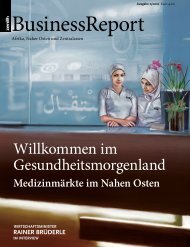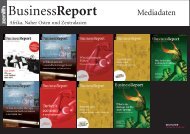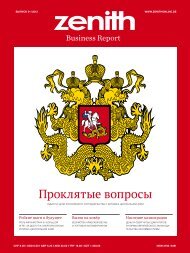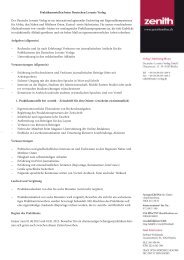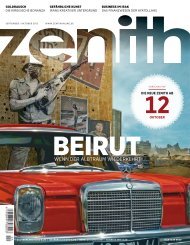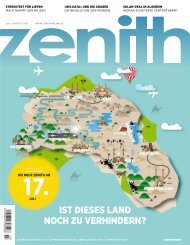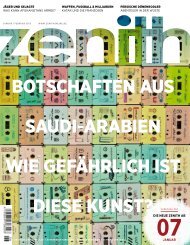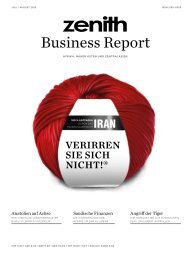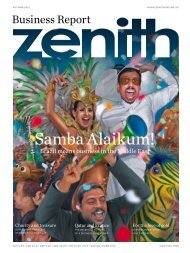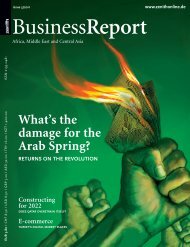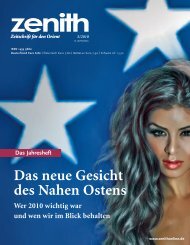You also want an ePaper? Increase the reach of your titles
YUMPU automatically turns print PDFs into web optimized ePapers that Google loves.
picture: UNEP<br />
South Sudan<br />
Safari<br />
The world‘s youngest nation is<br />
looking for alternative tourism<br />
expertise<br />
With almost no fully-formed roads, and<br />
just a few hotels, tourism infrastructure is<br />
as good as non-existent in South Sudan.<br />
Yet tourism is meant to be an economic<br />
pillar of the country that, to all intents and<br />
purposes, seems likely to declare its independence<br />
this July. The most important<br />
source of income for the region now and in<br />
the future is oil extraction – although there<br />
are ongoing disputes with the North<br />
about fair distribution of the proceeds. It<br />
is another good reason for wanting to expand<br />
tourism. In the first instance, this<br />
means promoting the National Parks.<br />
According to the government in Juba,<br />
around USD 140 million will be required<br />
over the next five years to achieve this –<br />
with South Sudan looking for support<br />
from abroad, and from private investors in<br />
particular. According to experts from the<br />
US Wildlife Conservation Society that is<br />
active in South Sudan, the country’s wildlife<br />
can certainly compete with that of the<br />
National Parks of Tanzania and Kenya.<br />
However, land mines, militia and poachers<br />
have severely decimated the animal<br />
population. While there were over 100,000<br />
elephants in South Sudan in the 1960s, only<br />
about 5,000 to 15,000 remain there today.<br />
Due to the lack of infrastructure,<br />
mass tourism in South Sudan is unlikely<br />
to happen anytime soon. But that is precisely<br />
what might make it appeal to individual<br />
travellers.<br />
Hold those jets,<br />
we’re hungry<br />
Full bellies more important<br />
to Iraqis than protecting their<br />
airspace<br />
Since the 2003 war, Iraq no longer has<br />
any fighter planes to speak of and cannot<br />
safeguard its airspace without outside<br />
help. For this reason, the Iraqi air<br />
force chief Anwar Ahmed is hoping to<br />
acquire 96 of the American Lockheed<br />
F-16 jets known as »Fighting Falcons«<br />
by 2020. If he has his way, in just under<br />
two years, the first Iraqi pilots will be<br />
patrolling their own airspace with 18<br />
such aircraft – which is also the prerequisite<br />
for all US troops actually pulling<br />
out of the country.<br />
In September 2010, the Pentagon approved<br />
the delivery of the first batch of 18 jets,<br />
Battle over<br />
underwear<br />
The Tunisian revolution<br />
reaches all the way to<br />
the lingerie sector<br />
Morocco and Tunisia, both well-known<br />
for their high-quality textiles, are competing<br />
for the contracts of European underwear<br />
manufacturers. The Moroccan textile<br />
association wants to create around<br />
20,000 new jobs. Production sites in the<br />
Mediterranean have it over their competition<br />
in China, with shorter delivery routes<br />
and freight times to Europe, and also<br />
more flexibility over the number of items<br />
supplied.<br />
Tunisian manufacturers, meanwhile,<br />
fear European companies will punish<br />
them for the political courage of their<br />
compatriots and increasingly turn to<br />
Morocco as a result of the unrest. »Clients<br />
won’t be pulling out of Tunisia but<br />
they are diversifying their sources of<br />
uPDATES<br />
including maintenance and training facilities,<br />
at an estimated cost of up to USD 4.2<br />
billion. After months of delays in the protracted<br />
process of forming a government<br />
in Baghdad in the wake of the last elections,<br />
Prime Minister Nouri al-Maliki, in<br />
his second role as Minister of Defence, received<br />
the approval of his cabinet on 26<br />
January to negotiate with the Americans<br />
over an initial instalment for the purchase.<br />
But on 14 February, the Iraqi government<br />
suddenly announced it would be<br />
postponing its purchase of the F-16s.<br />
Instead it planned to use the budgeted<br />
purchase price of USD 900 million to increase<br />
the subsidies on food rations for the<br />
population. Al-Maliki’s cabinet was forced<br />
to bow to street pressure. Ever since late<br />
January, mounting discontent with the<br />
lack of government action and lack of basic<br />
food supplies was voiced in demonstrations<br />
inspired by the recent protests in Tunisia<br />
and Egypt.<br />
supply«, was the Moroccan textile<br />
association’s attempt at reassurance.<br />
After all, Tunisia had now earned itself<br />
a certain »sympathy capital«. The Tunisian<br />
export agency CEPEX plans to leverage<br />
this capital. It has announced a<br />
special programme in Milan and Bologna<br />
at the end of March to showcase the<br />
strengths of Tunisian lingerie and<br />
swimwear fashion. Around 30 percent<br />
of Tunisia’s textile exports go to Italy.<br />
European underwear brands have been<br />
having their garments produced in Tunisia<br />
for years now, by such manufacturers<br />
as Mahdco in the harbour city of Mahdia.<br />
The company is particularly proud of its<br />
measures to counter youth unemployment.<br />
The average age of its 250 employees<br />
is just 26. The luxury brand Aubade, part<br />
of the Calida label, also outsources its production<br />
to Tunisia. In 2010, according to<br />
the latest Swiss sharemarket reports, Calida<br />
posted its best year since it went public<br />
in 2007, thanks to the success of the<br />
Aubade brand.<br />
BusinessReport 1/2011 09




